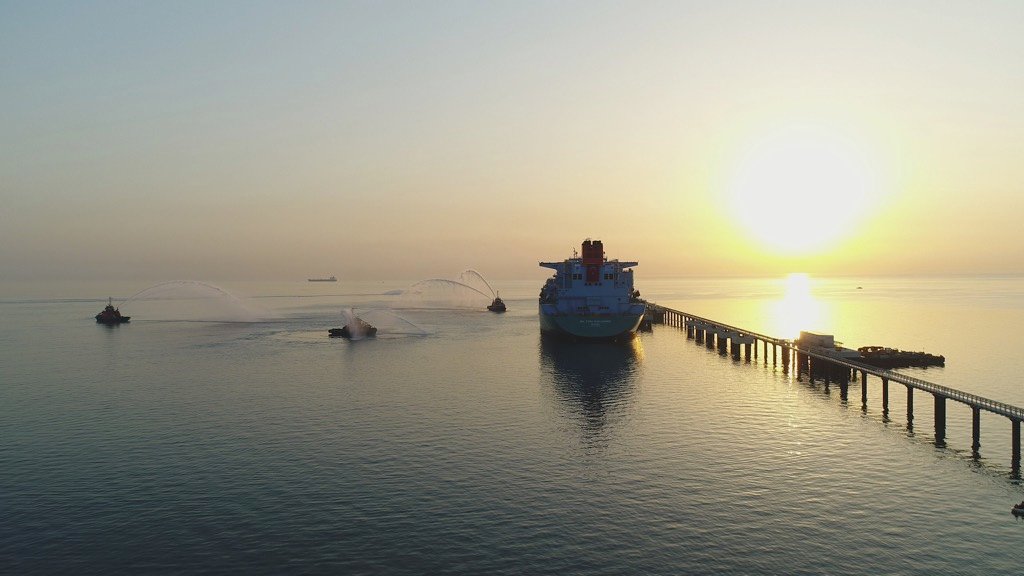Turkey’s Petroleum Pipeline Company (BOTAŞ) signed a deal to buy 1.2 million tons of liquefied natural gas (LNG) from French energy giant Total, according to international outlets late Wednesday.
The deal between the two sides will start in late 2020 and will run for three years.
The deal comes as BOTAŞ is nearing the expiry of long-term contracts with Nigeria and Algeria.
The deal with Nigeria ends in 2021 and with Algeria in 2024. A midterm contract with Qatargas will also expire at the end of the year.
Turkey’s natural gas consumption was estimated to total around 44.9 billion cubic meters in 2019. The country consumed 48.9 billion cubic meters in 2018, according to Anadolu Agency’s (AA) calculations from figures provided by Turkey’s Energy Market Regulatory Authority (EMRA).
Turkey imported 50.34 billion cubic meters of natural gas in 2018, a decrease of 8.88% from the imports of 55.25 billion cubic meters of gas in 2017.
The calculations reveal that Turkey imported around 11.32 billion cubic meters of gas as LNG and the rest via pipelines in 2018, verifying that the share of LNG out of total gas imports was 22.5% compared to 19% in 2017.
Turkey considers the purchase of cheaper natural gas and LNG an advantage for the diversification of its gas supplies. As spot LNG prices continue to fall with the glut of supply, Turkey wants to benefit from lower international prices and has increased LNG imports while keeping pipeline gas imports to a minimum.
The country’s LNG imports in March outpaced pipeline gas imports for the first time, data from EMRA showed last week, as it imported 2.06 billion cubic meters of LNG in March, accounting for 52.5% of total gas imports.
The increase in LNG imports can be partially attributed to the country’s expansion of its LNG infrastructure capacity in recent years. Turkey’s LNG facilities can cope with up to 120 million cubic meters of natural gas per day with LNG terminals and floating storage and regasification units (FRSU).
The country imported 3.9 billion cubic meters of natural gas in March, marking a decrease of 8.2% compared with March last year, the data showed.
BOTAŞ made the majority of the imports, at 95.3%, while the private sector imported the remaining share.
Turkey imported 786 million cubic meters of spot LNG from Qatar and 370 million cubic meters of spot LNG from the United States, EMRA’s data showed.
LNG imports from the U.S. increased by 300% in March compared to the same month last year. The remaining share of LNG imports came from Algeria, Nigeria, Cameroon and Egypt.
Pipeline gas imports in March totaled 1.87 billion cubic meters. Azerbaijan took the lion’s share with 924 million cubic meters, while Iran and Russia followed with 557 million cubic meters and 389 million cubic meters, respectively.
Imports from Russia, a country that historically supplied a huge share of Turkey’s natural gas supplies, were down by 72% in March compared with March 2019. Imports from Iran also fell by 33%.
Turkey’s Deputy Energy and Natural Resources Minister Alparslan Bayraktar earlier this month said LNG imports accounted for 28% of Turkey’s total natural gas imports in 2019 and that at least one-third of the country’s natural gas supply is expected to come from LNG in 2020.
He noted that 44% of gas came through LNG in the first four months of the year but that the number would come down in the coming months. Bayraktar said 40% of LNG imports in the first four months had come from the United States, adding that this contributed to a $100 billion trade target between Turkey and the U.S.









Discussion about this post